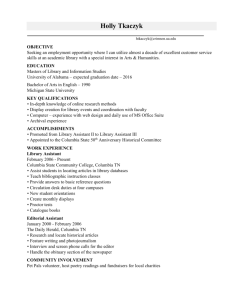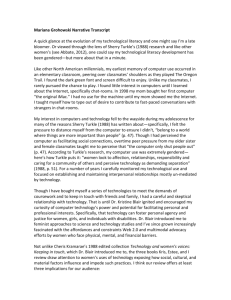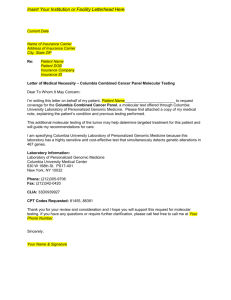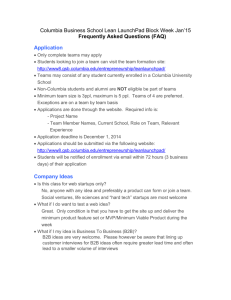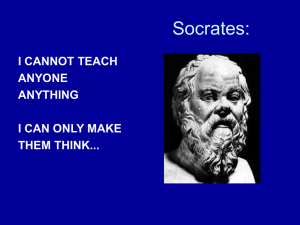United States Court of Appeals, Fourth Circuit. COLUMBIA
advertisement
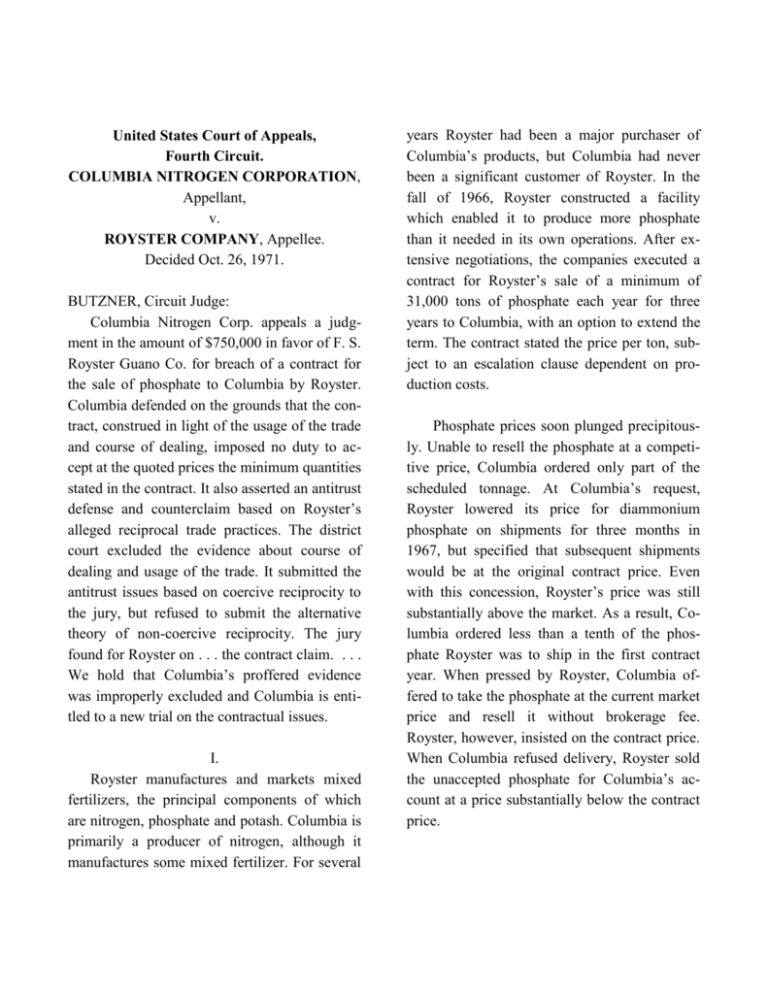
United States Court of Appeals, Fourth Circuit. COLUMBIA NITROGEN CORPORATION, Appellant, v. ROYSTER COMPANY, Appellee. Decided Oct. 26, 1971. BUTZNER, Circuit Judge: Columbia Nitrogen Corp. appeals a judgment in the amount of $750,000 in favor of F. S. Royster Guano Co. for breach of a contract for the sale of phosphate to Columbia by Royster. Columbia defended on the grounds that the contract, construed in light of the usage of the trade and course of dealing, imposed no duty to accept at the quoted prices the minimum quantities stated in the contract. It also asserted an antitrust defense and counterclaim based on Royster’s alleged reciprocal trade practices. The district court excluded the evidence about course of dealing and usage of the trade. It submitted the antitrust issues based on coercive reciprocity to the jury, but refused to submit the alternative theory of non-coercive reciprocity. The jury found for Royster on . . . the contract claim. . . . We hold that Columbia’s proffered evidence was improperly excluded and Columbia is entitled to a new trial on the contractual issues. I. Royster manufactures and markets mixed fertilizers, the principal components of which are nitrogen, phosphate and potash. Columbia is primarily a producer of nitrogen, although it manufactures some mixed fertilizer. For several years Royster had been a major purchaser of Columbia’s products, but Columbia had never been a significant customer of Royster. In the fall of 1966, Royster constructed a facility which enabled it to produce more phosphate than it needed in its own operations. After extensive negotiations, the companies executed a contract for Royster’s sale of a minimum of 31,000 tons of phosphate each year for three years to Columbia, with an option to extend the term. The contract stated the price per ton, subject to an escalation clause dependent on production costs. Phosphate prices soon plunged precipitously. Unable to resell the phosphate at a competitive price, Columbia ordered only part of the scheduled tonnage. At Columbia’s request, Royster lowered its price for diammonium phosphate on shipments for three months in 1967, but specified that subsequent shipments would be at the original contract price. Even with this concession, Royster’s price was still substantially above the market. As a result, Columbia ordered less than a tenth of the phosphate Royster was to ship in the first contract year. When pressed by Royster, Columbia offered to take the phosphate at the current market price and resell it without brokerage fee. Royster, however, insisted on the contract price. When Columbia refused delivery, Royster sold the unaccepted phosphate for Columbia’s account at a price substantially below the contract price. II. Columbia assigns error to the pretrial ruling of the district court excluding all evidence on usage of the trade and course of dealing between the parties. It offered the testimony of witnesses with long experience in the trade that because of uncertain crop and weather conditions, farming practices, and government agricultural programs, express price and quantity terms in contracts for materials in the mixed fertilizer industry are mere projections to be adjusted according to market forces. tue of its detail negates the proposition that the contract is open to variances in its terms. * * *” A number of Virginia cases have held that extrinsic evidence may not be received to explain or supplement a written contract unless the court finds the writing is ambiguous. . . . This rule, however, has been changed by the Uniform Commercial Code which Virginia has adopted. The Code expressly states that it “shall be liberally construed and applied to promote its underlying purposes and policies,” which include “the continued expansion of commercial practices through custom, usage and agreement of the parties * * *.” Va.Code Ann. § 8.1-102 (1965). The importance of usage of trade and course of dealing between the parties is shown by § 8.2202,FN4 which authorizes their use to explain or supplement a contract. The official comment states this section rejects the old rule that evidence of course of dealing or usage of trade can be introduced only when the contract is ambiguous.FN5 And the Virginia commentators, noting that “[t]his section reflects a more liberal approach to the introduction of parol evidence * * * than has been followed in Virginia,” express the opinion that Mathieson, supra, and similar Virginia cases no longer should be followed. . . . We hold, therefore, that a finding of ambiguity is not necessary for the admission of extrinsic evidence about the usage of the trade and the parties’ course of dealing. Columbia also offered proof of its business dealings with Royster over the six-year period preceding the phosphate contract. Since Columbia had not been a significant purchaser of Royster’s products, these dealings were almost exclusively nitrogen sales to Royster or exchanges of stock carried in inventory. The pattern which emerges, Columbia claimed, is one of repeated and substantial deviation from the stated amount or price, including four instances where Royster took none of the goods for which it had contracted. Columbia offered proof that the total variance amounted to more than $500,000 in reduced sales. This experience, a Columbia officer offered to testify, formed the basis of an understanding on which he depended in conducting negotiations with Royster. The district court held that the evidence should be excluded. It ruled that “custom and usage or course of dealing are not admissible to contradict the express, plain, unambiguous language of a valid written contract, which by vir- FN4. Va.Code Ann. § 8.2-202 provides: “Terms with respect to which the con- 2 firmatory memoranda of the parties agree or which are otherwise set forth in a writing intended by the parties as a final expression of their agreement with respect to such terms as are included therein may not be contradicted by evidence of any prior agreement or of a contemporaneous oral agreement but may be explained or supplemented (a) by course of dealing or usage of trade (§ 8.1-205) or by course of performance (§ 8.2-208); and the Uniform Commercial Code restates the well established rule that evidence of usage of trade and course of dealing should be excluded whenever it cannot be reasonably construed as consistent with the terms of the contract. . . . Royster argues that the evidence should be excluded as inconsistent because the contract contains detailed provisions regarding the base price, escalation, minimum tonnage, and delivery schedules. The argument is based on the premise that because a contract appears on its face to be complete, evidence of course of dealing and usage of trade should be excluded. We believe, however, that neither the language nor the policy of the Code supports such a broad exclusionary rule. Section 8.2-202 expressly allows evidence of course of dealing or usage of trade to explain or supplement terms intended by the parties as a final expression of their agreement. When this section is read in light of Va. Code Ann. § 8.1-205(4),FN7 it is clear that the test of admissibility is not whether the contract appears on its face to be complete in every detail, but whether the proffered evidence of course of dealing and trade usage reasonably can be construed as consistent with the express terms of the agreement. (b) by evidence of consistent additional terms unless the court find the writing to have been intended also as a complete and exclusive statement of the terms of the agreement.” FN5. Va.Code Ann. § 8.2-202, Comment 1 states: “This section definitely rejects: ***** “(c) The requirement that a condition precedent to the admissibility of the type of evidence specified in paragraph (a) is an original determination by the court that the language used is ambiguous.” FN7. Va.Code Ann. § 8.1-205(4) states: “The express terms of an agreement and an applicable course of dealing or usage of trade shall be construed wherever reasonable as consistent with each other; but when such construction is unreasonable express terms control both course of We turn next to Royster’s claim that Columbia’s evidence was properly excluded because it was inconsistent with the express terms of their agreement. There can be no doubt that 3 dealing and usage of trade and course of dealing controls usage of trade.” for liquidated damages of $10 for each ton Columbia declined to accept. On the other hand, Royster rejected a Columbia proposal for a clause that tied the price to the market by obligating Royster to conform its price to offers Columbia received from other phosphate producers. The parties, having rejected both proposals, failed to state any consequences of Columbia’s refusal to take delivery–the kind of default Royster alleges in this case. Royster insists that we span this hiatus by applying the general law of contracts permitting recovery of damages upon the buyer’s refusal to take delivery according to the written provisions of the contract. This solution is not what the Uniform Commercial Code prescribes. Before allowing damages, a court must first determine whether the buyer has in fact defaulted. It must do this by supplementing and explaining the agreement with evidence of trade usage and course of dealing that is consistent with the contract’s express terms. Va.Code Ann. §§ 8.1-205(4), 8.2-202. Faithful adherence to this mandate reflects the reality of the marketplace and avoids the overly legalistic interpretations which the Code seeks to abolish. The proffered testimony sought to establish that because of changing weather conditions, farming practices, and government agricultural programs, dealers adjusted prices, quantities, and delivery schedules to reflect declining market conditions. For the following reasons it is reasonable to construe this evidence as consistent with the express terms of the contract: The contract does not expressly state that course of dealing and usage of trade cannot be used to explain or supplement the written contract. The contract is silent about adjusting prices and quantities to reflect a declining market. It neither permits nor prohibits adjustment, and this neutrality provides a fitting occasion for recourse to usage of trade and prior dealing to supplement the contract and explain its terms. Minimum tonnages and additional quantities are expressed in terms of “Products Supplied Under Contract.” Significantly, they are not expressed as just “Products” or as “Products Purchased Under Contract.” The description used by the parties is consistent with the proffered testimony. Royster also contends that Columbia’s proffered testimony was properly rejected because it dealt with mutual willingness of buyer and seller to adjust contract terms to the market. Columbia, Royster protests, seeks unilateral adjustment. This argument misses the point. What Columbia seeks to show is a practice of mutual adjustments so prevalent in the industry and in prior dealings between the parties that it formed a part of the agreement governing this transac- Finally, the default clause of the contract refers only to the failure of the buyer to pay for delivered phosphate. During the contract negotiations, Columbia rejected a Royster proposal 4 tion. It is not insisting on a unilateral right to modify the contract. . . . Indeed, the Code’s official commentators urge that overly simplistic and overly legalistic interpretation of a contract should be shunned.FN11 Nor can we accept Royster’s contention that the testimony should be excluded under the contract clause: FN10. Va.Code Ann. § 8.2-202, Comment 2 states: “No verbal understanding will be recognized by either party hereto; this contract expresses all the terms and conditions of the agreement, shall be signed in duplicate, and shall not become operative until approved in writing by the Seller.” “Paragraph (a) [of § 8.202] makes admissible evidence of course of dealing, usage of trade and course of performance to explain or supplement the terms of any writing stating the agreement of the parties in order that the true understanding of the parties as to the agreement may be reached. Such writings are to be read on the assumption that the course of prior dealings between the parties and the usages of trade were taken for granted when the document was phrased. Unless carefully negated they have become an element of the meaning of the words used. Similarly, the course of actual performance by the parties is considered the best indication of what they intended the writing to mean.” Course of dealing and trade usage are not synonymous with verbal understandings, terms and conditions. Section 8.2-202 draws a distinction between supplementing a written contract by consistent additional terms and supplementing it by course of dealing or usage of trade. Evidence of additional terms must be excluded when “the court finds the writing to have been intended also as a complete and exclusive statement of the terms of the agreement.” Significantly, no similar limitation is placed on the introduction of evidence of course of dealing or usage of trade. Indeed the official comment notes that course of dealing and usage of trade, unless carefully negated, are admissible to supplement the terms of any writing, and that contracts are to be read on the assumption that these elements were taken for granted when the document was phrased.FN10 Since the Code assigns course of dealing and trade usage unique and important roles, they should not be conclusively rejected by reading them into stereotyped language that makes no specific reference to them. See also Levie, Trade Usage and Custom under the Common Law and the Uniform Commercial Code, 40 N.Y.U.L.Rev. 1101, 1111 (1965). FN11. Referring to the general provisions about course of dealing and trade usage, Va. Code Ann. § 8.1-205, Com- 5 ment 1 states: “This Act rejects both the ‘lay dictionary’ and the ‘conveyancer’s’ reading of a commercial agreement. Instead the meaning of the agreement of the parties is to be determined by the language used by them and by their action, read and interpreted in the light of commercial practices and other surrounding circumstances. The measure and background for interpretation are set by the commercial context, which may explain and supplement even the language of a formal or final writing.” We conclude, therefore, that Columbia’s evidence about course of dealing and usage of trade should have been admitted. Its exclusion requires that the judgment against Columbia must be set aside and the case retried. ***** 6
